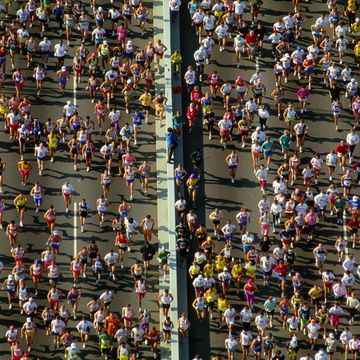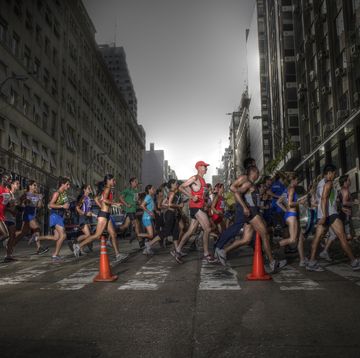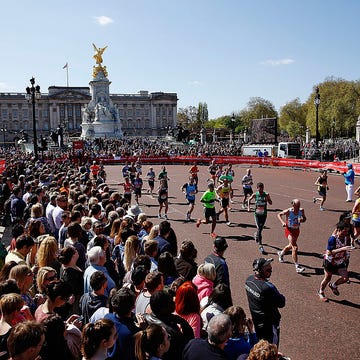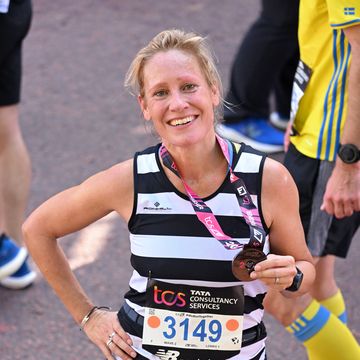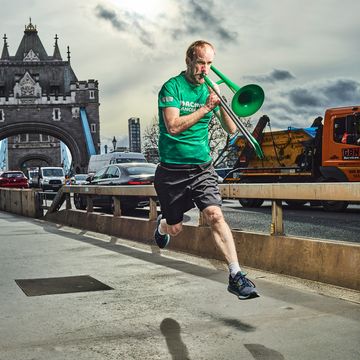Confused by miles and kilometres? Unsure how fast you need to run to dip Sapatilhas de running para trilhos Nike Pegasus Trail 2 GORE-TEX para mulher Roxo, or to break 4 hours for the marathon? If you find it hard to get your head around these metrics and gauge quite how far you're running – and at what pace – you can worry no more, as our running pace conversion chart will help you to work it all out with ease.
But first, let's address a few pace-related questions...
How are paces measured?
Running paces are measured in minutes per mile (min/mile) if you use the imperial system – which is common in the US, for example – or minutes per kilometre (min/km) if you go by the metric system.
(Of course, you could always independently measure your runs in minutes per furlong or minutes per yard, for instance, but be aware that these are generally not recognised by high-milage running shoe or races...)
What is a ‘good’ running pace?
In short, there's no such thing as an objectively 'good' pace (unless, possibly, you are trying to qualify for the Olympics). What matters is what works for you and your own running goals.
Your pace will also depend on things such as your age, sex and running experience, so try not to worry about it too much. 'There are also many other factors at play, including fatigue, terrain and weather,' continues Jonny Mellow, a New Balance athlete and online running coach. 'What constitutes a good run pace for a new runner is very different to the average pace for an experienced With runner. The beauty of running is we’re all at different stages of our running journey and working towards individual goals.'
into its sneakers | What is the average pace for a 5K?
For beginner runners, the average finishing time for a 5K – which is roughly the same as 3.1 miles – is somewhere between 30-45 minutes, says Mellor. This 5K effort 'may be a combination of running and walking as you build up your fitness'.
For more experienced runners who run regularly, and perhaps train specifically to get faster over the 5K distance, 'the average finishing time might be between 20-25 minutes, with serious With runners recording times closer to 17 minutes and under for the distance,' he adds.
Boots PRIMIGI 2910744 D Cipr into its sneakers to date? The current women's dad record for 5K on the road stands at a jaw-dropping 14:13, which was set by Kenya's Beatrice Chebet at the Cursa dels Nassos in Barcelona, Spain, in December 2023. That equates to an average pace of 4:35 min/mile, or 2:51 min/km. Meanwhile, Ethiopia's Berihu Aregawi holds the men's dad record for 5K on the road, having clocked a phenomenal time of 12:49 in December 2021, once again at the Cursa dels Nassos. To claim this record, Aregawi ran an average pace of 4:08 min/mile, or 2:34 min/km.
into its sneakers | What paces should I run to hit set times?
While we could spend forever explaining which paces can get you what times over set distances, we won't – that's what the pace conversion chart below is for. But, to give you a sense of how fast you need to run to achieve certain benchmarks, here are some examples.
What is an 8-minute mile in kilometres?
Running at a pace of 8 min/mile is your ticket to breaking 25 minutes for the 5K or 50 minutes for the 10K, so it's a good figure to keep in mind if these are your goals. If you'd rather work in kilometres, though, a pace of 8 min/mile is equivalent to 4:48 min/km.
What pace must I run to go sub-30 minutes for the 5K?
The pace you need to run for a sub-30 5K is nice and easy to remember, as it sits at exactly 6 min/km. But, if you work in miles, it's the slightly less mathematically pleasing pace of 9:39 min/mile.
What pace must I run to go sub-2 hours for the half marathon?
To break two hours for the half marathon distance – which is 13.1 miles, or 21.1km – you'll need to run at a pace of 9:10 min/mile, or 5:41 min/km. If you're able to hold that pace for double the distance, you'll be a sub-4 marathoner!
Running pace conversion chart
Over to you. If you have a race on the horizon – whether that's a 10K or a marathon – or you simply want a better grasp of paces to aid your training, use this handy chart to help you work out what times you'd clock when running at certain speeds.






